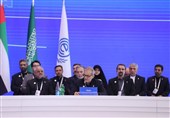Iran Can Guide Solid-Propellant Missiles in Outer Space: IRGC General
TEHRAN (Tasnim) – Commander of the IRGC Aerospace Force said Iran has acquired the know-how to guide solid-propellant missiles outside the Earth’s atmosphere.
The Islamic Revolution Guards Corps on Sunday unveiled a new missile with a composite engine as well as the new generation of engines for propelling missiles and satellite carriers.
Speaking to reporters at the unveiling ceremony, IRGC Aerospace Force Commander Brigadier General Amir Ali Hajizadeh said the moving nozzle technology used in the new engines has enabled Iran to guide the solid-propellant missiles outside the Earth's atmosphere.
He explained that the new technology allows for the navigation of spacecraft, satellite carriers and anti-air defense missiles in the outer space.
The IRGC has inaugurated an assembly line producing “Ra’ad-500” (thunder-500) missiles equipped with an advanced composite engine dubbed “Zohair”.
The new Iranian missile enjoys an engine made up of carbon fiber composites, which enable the engine’s shield to withstand pressures up to 100 bars and temperatures as high as 3,000 degrees Celsius and also reduce the total weight of the missile dramatically.
The employment of two technologies, namely the composite engine shield and the moving nozzle, have allowed for the use of solid propellant engines outside the atmosphere.
The new achievement enables Iran to manufacture light satellite carriers with solid propellant, produce surface-to-surface missiles with a small radar cross-sectional area, enhance the maneuverability of missiles to defeat missile defense systems, and reduce the costs and complexity of production of missiles.






